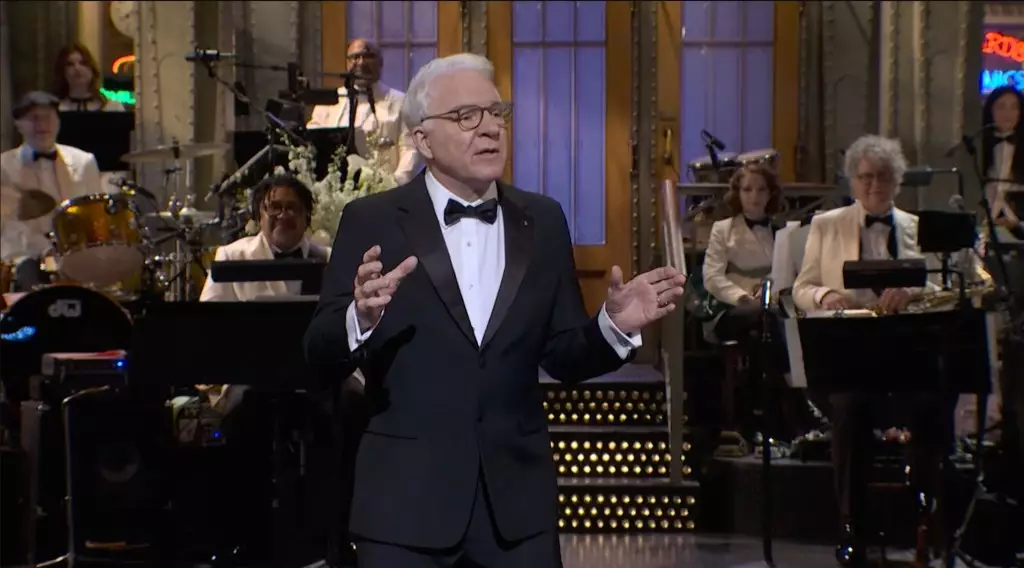Saturday Night Live (SNL) has been a cornerstone of American comedy since its inception in 1975, launching countless careers and shaping cultural discourse through satire. The SNL50: The Anniversary Special celebrated this legacy, with Steve Martin making a conspicuous return to the stage as he sought to reclaim his title for most episodes hosted—a record he shares with Alec Baldwin. While officially uncounted, this monologue was a masterclass that illustrated the comedic wit and the political savvy that have characterized Martin’s career.
Steve Martin wasn’t alone in his comedic endeavor; he was joined by longtime collaborator Martin Short and intriguing guest John Mulaney. Their synergy reinforced the notion that comedy is best experienced as a collective, where laughter draws from shared experiences and camaraderie. Martin’s opening line, introducing himself as SNL’s “newest diversity hire,” was not merely a humorous jab; it reflected the ongoing conversation surrounding diversity, equity, and inclusion (DEI) in the public sphere. With the recent policy changes under the Trump administration, Martin’s commentary was both pointed and timely, exemplifying how comedy can be an agent for reflection and critique.
The monologue didn’t shy away from politics, a hallmark of SNL’s longstanding tradition. Martin’s quip about vacationing on the “Gulf of Steve Martin” satirically spun the Trump-era renaming of the Gulf of Mexico, providing a lens through which audiences can engage with current events. This moment showcased how comedy gives a voice to dissent while fostering communal experiences, as audiences are able to laugh at the absurdities of political maneuvers and societal shifts.
Humor within SNL often thrives on intertwining timelessness with relevance, and Martin’s musings about the show’s aging dynamics, suggesting people born during its debut season could be “easily dead of natural causes,” invoked both nostalgia and a stark commentary on the passage of time. His reflection spoke not just to SNL’s legacy but to the inevitable march of time that influences all performers and creatives.
The Art of Tribute and Self-Deprecation
Comedy is often self-referential, and Martin’s remarks about Bill Murray were laced with affectionate ribbing. His choice to highlight Murray’s absence by joking about not inviting him echoed the camaraderie of old friends rather than mere comedic rivalry. The reverence shown toward past and current SNL writers through a mock tribute highlighted the importance of those behind the scenes, reminding audiences that comedic brilliance stems not just from the performers on the stage but also from the countless writers whose ingenuity fuels every sketch. By stating that this tribute was “written by AI,” Martin cleverly turned the conversation towards the intersection of technology and creativity, a contemporary issue often debated in the realms of art and comedy.
Mulaney’s commentary brought a fresh perspective to the monologue as he positioned the celebrity hosts as integral to SNL’s essence. His words transcended mere humor, speaking to the complex relationships that form between icons and the public. Celebrity culture has long been a double-edged sword, attracting admiration yet also demanding critique. Mulaney’s casual assertion about the “difficult people” in the room resonated with audiences who are both enamored and exhausted by the demands of celebrity.
As the night unfolded, the combination of Steve Martin’s clever political commentary, Martin Short’s comedic timing, and John Mulaney’s sharp observations echoed the quintessential spirit of SNL. It proved that while time may pass, the relevance of such discussions never fades. These iconic figures reminded viewers that laughter can be a profound avenue for dialogue on serious issues, blending entertainment with advocacy in a way that remains essential to the fabric of American culture.
The SNL50 Anniversary Special was more than just a celebratory event; it was a testament to the resilience, relevance, and renewal of comedy in navigating the complexities of society. The night served as a reminder that while roles, politics, and humor may evolve, the heart of SNL—a platform for social satire—remains steadfast, proving once again that laughter endures as a critical tool for commentary.

